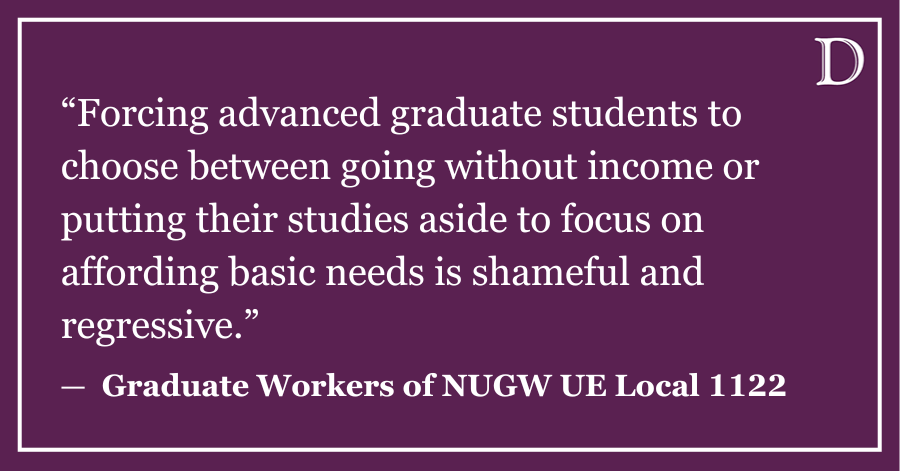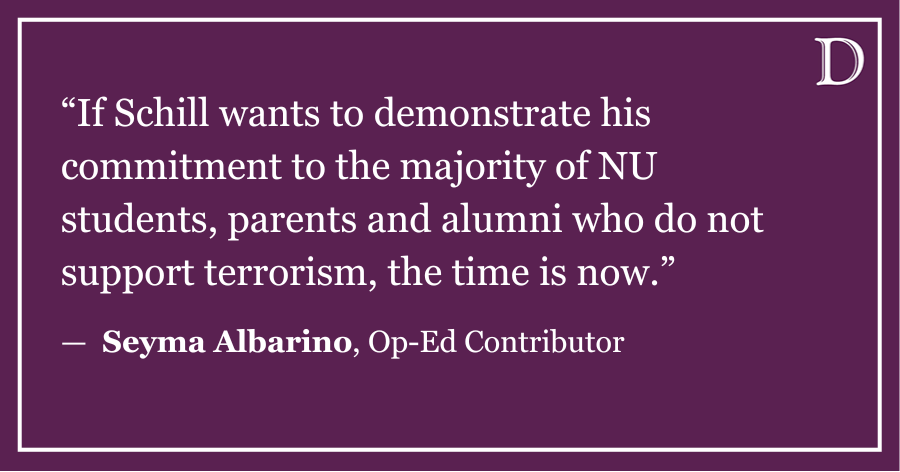We are experiencing another dark chapter in American history. The right to voice dissent and our commitment to free speech are under serious attack.
Hamas’ brutal attacks on Israel on Oct. 7, the Israeli Defense Forces’ unrelenting destruction of Gaza, settler violence against Palestinians in the West Bank and a spike in antisemitic and Islamophobic incidents have triggered deep divisions at American universities. Speakers have been canceled, student organizations have been banned, and politicians, alumni, donors and others are demanding that colleges crack down on political advocacy they label “hate speech.”
As an undergraduate at Northwestern in the 1960s, I protested against the Vietnam War. What I learned inside and outside the classroom helped prepare me for a life committed to the belief that the greatest threat to democracy is when those in power seek to suppress robust and open debate –– especially on highly charged political issues.
On Oct. 4, 2001, I returned to Northwestern to address a group of students about the one-month anniversary of the Sept. 11 attacks. With the attacks still fresh in everyone’s mind, I told the students that my own patriotism was “about diversity and equality.” Sept. 11 changed each of us, I said, “but it did not change the Constitution and it did not change the Bill of Rights.” I quoted Benjamin Franklin: “Those who would give up essential liberty to purchase a little temporary safety deserve neither liberty nor safety.”
22 years later, much of what I said then applies today. Fundamental principles of free speech and academic freedom are deeply misunderstood, prompting authorities to suppress free and open debate.
Let’s be clear. Public colleges and universities, like all arms of the government, are bound by the First Amendment. And many private institutions, including Northwestern, are bound by comparable standards of free speech set forth in student and faculty handbooks and in university policies.
The current Northwestern student handbook assures students they “will be free from censorship in the publication and dissemination of their views as long as these are not represented as the views of Northwestern University and do not violate any University policies.” Students are also “free to form, join, and participate in any group for intellectual, religious, social, economic, political, or cultural purposes,” according to the handbook.
But these freedoms are not absolute, just as the First Amendment is not absolute. There are certain narrowly defined exceptions to the First Amendment, including personal insults that are intended and likely to produce an immediate violent response (“fighting words”); speech directly targeting a single individual or small group with intent to instill a reasonable fear they will be subjected to imminent violence (“true threats”); intentional incitement of imminent violence that is likely to happen imminently, or the solicitation of acts of violence against specific individuals (“incitement”); and speech in the workplace or educational institutions that is sufficiently severe and pervasive to create a hostile environment or alter the conditions of employment or education (“harassment”).
Contrary to popular opinion, there is no First Amendment exception for “hate speech” unless it falls within one of the exceptions listed above. Vile, shameful, offensive and hateful speech, standing alone, is constitutionally protected.
In a unanimous and ground-breaking 1969 decision, the U.S. Supreme Court declared that “the constitutional guarantees of free speech and free press do not permit a State to forbid or proscribe advocacy of the use of force or of law violation except where such advocacy is directed to inciting or producing imminent lawless action and is likely to incite or produce such action.” The Court added that merely advocating the moral necessity of force and violence — without engaging in or taking concrete steps to engage in violence — is not against the law.
When accurately understood, these fundamental First Amendment principles make clear that many of the recent threats to free speech on campus promote a dangerously distorted interpretation of the law.
For example, on Oct. 25, 2023, the Anti-Defamation League and The Louis D. Brandeis Center for Human Rights Under Law wrote a joint letter to nearly 200 American colleges and universities urging them to investigate the activities of campus chapters of Students for Justice in Palestine for “potential violations of the prohibition against materially supporting a foreign terrorist organization.”
That’s a very serious accusation. In fact, to date, student chapters of SJP have been suspended at Columbia, Brandeis (unaffiliated with the center), George Washington and Rutgers. Two chapters in Florida are in limbo.
However, the joint letter does not accuse SJP of engaging in any conduct that would qualify as an exception to the First Amendment. Instead, it simply accuses SJP of disseminating “anti-Israel propaganda” that is “often laced with inflammatory and combative rhetoric,” calling for “confronting and ‘dismantling’ Zionism on U.S. college campuses,” and chanting statements like “We are Hamas” and “We echo Hamas.”
As we have seen, these forms of speech are all constitutionally protected unless they cross the line into one of the exceptions, which the letter does not allege.
Other statements made by pro-Palestinian or pro-Israeli groups —such as claims that Hamas or Israel has engaged in “genocide,” the chant “from the river to the sea, Palestine will be free”— are also constitutionally protected, provided they do not fall within one of the exceptions.
It is not antisemitic to criticize Israel or its policies and it is not Islamophobic to criticize Hamas, Palestinians or their policies. But even antisemitic and Islamophobic statements, other than those that fall into one of the exceptions, cannot be censored under the First Amendment — though they can and should be roundly condemned.
Almost 100 years ago, Justice Oliver Wendell Holmes, Jr. explained that the Constitution protects not only “free thought for those who agree with us but freedom for the thought that we hate.”
When the heavy hand of censorship is wielded by government officials or college administrators, no one is safe, be they pro-Israel, pro-Palestine or any other viewpoint that those in power choose to suppress. If today the speech you loathe is censored, tomorrow the speech you love can be censored.
We need a broad, outspoken, non-partisan reaffirmation of what Justice William J. Brennan Jr. called “a profound national commitment to the principle that debate on public issues should be uninhibited, robust, and wide-open.”
Stephen Rohde is a retired constitutional lawyer who graduated from Northwestern in 1966. He is the author of two books and numerous articles on the First Amendment and constitutional law. If you would like to respond publicly to this op-ed, send a Letter to the Editor to [email protected]. The views expressed in this piece do not necessarily reflect the views of all staff members of The Daily Northwestern.















